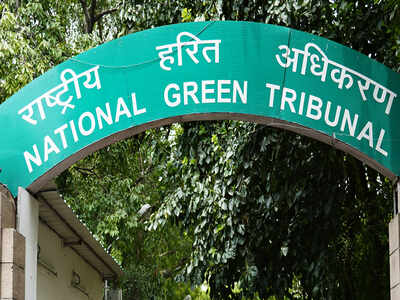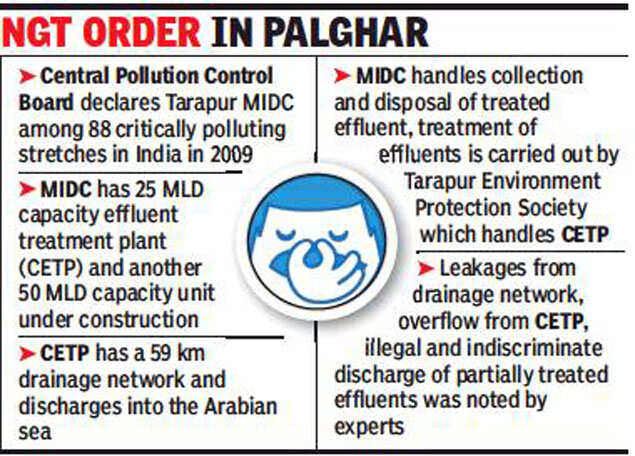
MUMBAI: The National Green Tribunal (NGT) has ordered 102 industrial units and the operators of the common effluent treatment plant in Tarapur MIDC area of Palghar to collectively pay up Rs 160 crore for restoration of the environment damaged by the discharge of untreated effluents into drains, creeks and the sea. This includes Rs 75 crore as a ‘Super Fund’ to meet expenses of remediation.
There are 1,216 units of textile processors, steel processors, chemicals, dyes and dye intermediates, pharmaceuticals, pesticides and others located inside the industrial estate.

This is the second such order obtained by a local fishing community in Maharashtra challenging the environmental pollution in the vicinity of their villages. The earlier order was won by the fishing villages of Mahul and Ambapada in Mumbai.
Accountability of the CETP and the 102 units in terms of damage recovery cost was fixed after a hearing. The recovery from each unit varies from Rs 90,000 to Rs 11 crore while the damage recovery cost from the CETP operators has been fixed at Rs 70 crore.
The untreated chemical effluent released in the region has impacted the lives and livelihood of residents of 18 fishing villages from Tarapur to Kelve. While the villagers had complained to the state environment department, Maharashtra Pollution Control Board and MIDC, none of the agencies took cognizance.
In 2016 when dead fish surfaced yet again on the adjoining seas, the Akhil Bharatiya Mangela Samaj Parishad representing the 18 villages approached the National Green Tribunal (NGT) for action against the polluters.
The NGT in September 2019 appointed a five-member expert committee to ascertain the extent of damage, cost of restoration of the environment and individual accountability of the CETP operators and the industrial units. It had at the time ordered the larger units to deposit Rs 1 crore each, the medium-sized ones Rs 50 lakh each and smallscale industries Rs 25 lakh each as interim compensation. The CETP was directed to deposit Rs 10 crore with the Central Pollution Control Board.
The report submitted to the NGT examined the performance of the CETP from April 2011 to November 2019. It found drains and groundwater in and around Tarapur MIDC were contaminated due to effluent discharge. “The creeks and sea also have impact due to discharges from CETP and other units in Tarapur MIDC… the reports reveal that there has been consistent violation with respect to effluent flow and quality both exceeding the inlet design parameters; outlet effluent quality exceeding the prescribed outlet standards; and overflows from CETP to surroundings. The Central Pollution Control Board (CPCB) has also monitored the CETP jointly with MPCB on various occasions during 2007 to 2013 and in January, 2018. The results of such joint monitoring also reveal that the CETP did not meet the prescribed discharge standards,” says the NGT order.
The CETP availed subsidy from government and collected membership fee and treatment fees from member units but has consistently violated the prescribed standards under the Consent to Operate granted to them by MPCB,” reads the NGT order.
The order states that the CETP and the industries were made aware of roles and responsibility through Environment Clearance/Consolidated Consent and Authorisation and thus the ‘polluter pays principle’ is applicable and they can be penalised for breach of terms.
There are 1,216 units of textile processors, steel processors, chemicals, dyes and dye intermediates, pharmaceuticals, pesticides and others located inside the industrial estate.

This is the second such order obtained by a local fishing community in Maharashtra challenging the environmental pollution in the vicinity of their villages. The earlier order was won by the fishing villages of Mahul and Ambapada in Mumbai.
Accountability of the CETP and the 102 units in terms of damage recovery cost was fixed after a hearing. The recovery from each unit varies from Rs 90,000 to Rs 11 crore while the damage recovery cost from the CETP operators has been fixed at Rs 70 crore.
The untreated chemical effluent released in the region has impacted the lives and livelihood of residents of 18 fishing villages from Tarapur to Kelve. While the villagers had complained to the state environment department, Maharashtra Pollution Control Board and MIDC, none of the agencies took cognizance.
In 2016 when dead fish surfaced yet again on the adjoining seas, the Akhil Bharatiya Mangela Samaj Parishad representing the 18 villages approached the National Green Tribunal (NGT) for action against the polluters.
The NGT in September 2019 appointed a five-member expert committee to ascertain the extent of damage, cost of restoration of the environment and individual accountability of the CETP operators and the industrial units. It had at the time ordered the larger units to deposit Rs 1 crore each, the medium-sized ones Rs 50 lakh each and smallscale industries Rs 25 lakh each as interim compensation. The CETP was directed to deposit Rs 10 crore with the Central Pollution Control Board.
The report submitted to the NGT examined the performance of the CETP from April 2011 to November 2019. It found drains and groundwater in and around Tarapur MIDC were contaminated due to effluent discharge. “The creeks and sea also have impact due to discharges from CETP and other units in Tarapur MIDC… the reports reveal that there has been consistent violation with respect to effluent flow and quality both exceeding the inlet design parameters; outlet effluent quality exceeding the prescribed outlet standards; and overflows from CETP to surroundings. The Central Pollution Control Board (CPCB) has also monitored the CETP jointly with MPCB on various occasions during 2007 to 2013 and in January, 2018. The results of such joint monitoring also reveal that the CETP did not meet the prescribed discharge standards,” says the NGT order.
The CETP availed subsidy from government and collected membership fee and treatment fees from member units but has consistently violated the prescribed standards under the Consent to Operate granted to them by MPCB,” reads the NGT order.
The order states that the CETP and the industries were made aware of roles and responsibility through Environment Clearance/Consolidated Consent and Authorisation and thus the ‘polluter pays principle’ is applicable and they can be penalised for breach of terms.

Coronavirus outbreak
Trending Topics
LATEST VIDEOS
More from TOI
Navbharat Times
Featured Today in Travel
Get the app








